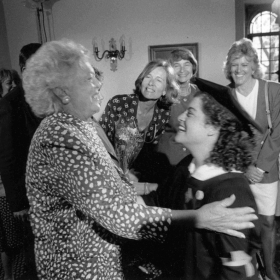With a syndicated column in the Washington Post, Judith Perlman Martin ’59, known as Miss Manners, has offered advice on how to conduct oneself in polite society for decades. The etiquette maven and journalist imparts guidance on topics such as table manners, sending gifts, and how to be a gracious host. Her multiple books and e-books include Miss Manners: On Endless Texting and Star-Spangled Manners, a study of etiquette in American democracy.
Her latest, Minding Miss Manners: In an Era of Fake Etiquette, is a guide to modern manners. With wit, she tackles topics like how to escape lengthy, forced discussions with ride-share drivers and whether it’s OK to send a text as a thank you for a gift. (The answer is no.)
We caught up with Martin, who, in nonpandemic times, splits her time between Washington, D.C., and Venice, to talk about etiquette in this era.
How are Americans behaving nowadays?
As you will have noticed, people are screaming at one another in the streets, and dissension with strangers is routinely expressed as death threats. Yet there is progress in that recognition of historic and current wrongs have newly engaged the larger society.
How did we get here?
Civilization requires a balance between the rights of the individual and the requirements of the community. A society that suppresses the freedom of the individual is intolerable, but so is a society that allows individuals to use that freedom to trample on others. History teeters between those extremes, and we are in a period of neglecting the goal of a peaceful communal life for all.
What are some of our most serious etiquette problems?
Aside from the above? When we get those solved, we should do something about blatant greed. Solvent people have become shameless about using any excuse (milestones, but also just declarations of wanting luxuries they can’t afford) to extract money and goods from their relatives, guests, and anyone they can reach online.
How can we restore civility to everyday American life?
We could pay attention in civics class and understand that our form of government requires reaching a workable consensus. Therefore people who have opposing views should not treat one another as enemies, and should stop regarding compromise as weakness.
Blumberg is a Houston-based freelance writer. Follow her on Twitter @dlblumberg.







We ask that those who engage in Wellesley magazine's online community act with honesty, integrity, and respect. (Remember the honor code, alums?) We reserve the right to remove comments by impersonators or comments that are not civil and relevant to the subject at hand. By posting here, you are permitting Wellesley magazine to edit and republish your comment in all media. Please remember that all posts are public.